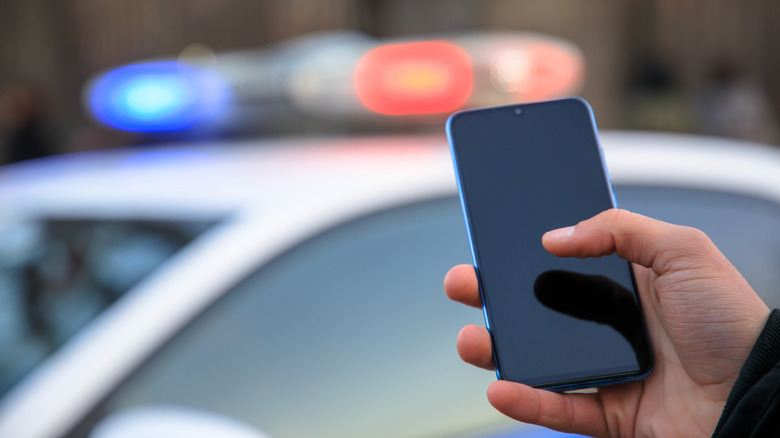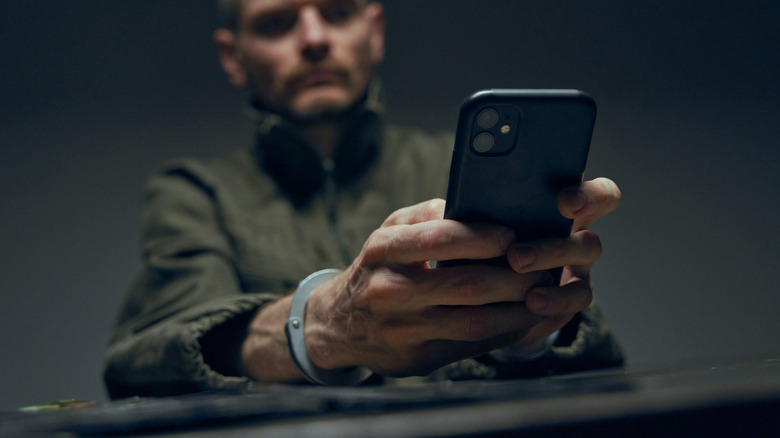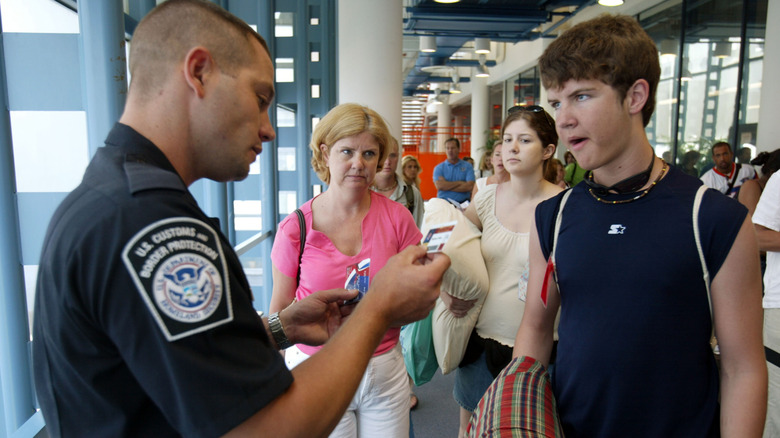Never Give The Police Your Phone Without A Warrant - Here's Why
In our digital age, no item has the potential to reveal more about us than our smartphones. After snooping through messages, social media, and other surprising things smartphones track, a total stranger would have a complete picture of your life. For this reason, most smartphone owners keep their phones locked. But what happens when the stranger demanding to see your phone is a police officer, FBI agent, or other government official? Whether or not you've done anything wrong, you should never give police or other law enforcement your phone unless they can produce a warrant.
It's a common misconception that, if you have nothing to hide, you should cooperate with the police. But that's a dangerous notion, and it's the reason the Fifth Amendment to the U.S. Constitution exists. You're probably familiar with the clause of the Miranda rights which states, "Anything you say can and will be used against you in a court of law." That's a promise, not a possibility, and it extends to any information collected from you, including a search of your phone. For example, a random selfie could place you at the scene of a crime you didn't know was happening. Handing an officer your phone could be legally misconstrued as permission to search it. For instance, handing police your digital ID in Apple Wallet could be construed as consent to read your text messages. Thankfully, you have a constitutional right not to have your phone searched unless a warrant is issued for it. There are major exceptions, though, especially if your phone has a biometric lock, or if you're at a U.S. border. Here's what you need to know.
Your privacy rights extend to your phone, with one major exception
In Riley v California, the Supreme Court handed down a landmark ruling affirming the unconstitutionality of warrantless cell phone searches, even if the phone's owner is under arrest. There are exceptions — warrantless searches are allowed in "exigent circumstances," defined in another Circuit ruling which was mostly upheld by the Supreme Court as "circumstances that would cause a reasonable person to believe that entry ... was necessary to prevent physical harm to the officers or other persons, the destruction of relevant evidence, the escape of the suspect ..." Under that standard, there's some leeway to justify a warrantless search. However, that's all the more reason not to cooperate without a warrant. Once you've cooperated, it could be considered a voluntary search, and you may lose the ability to fight it in court.
When it comes to protection, this may only extend to phones protected by a password, PIN, or pattern — the law is split regarding whether police can force you to use a fingerprint or FaceID to open your device. In 2024, the U.S. Court of Appeals for the 9th Circuit ruled against a claimant after police forced his thumb onto the screen of his phone to unlock it, arguing that doing so was no different from taking his fingerprints at booking. However, in early 2025, the D.C. Circuit ruled the other way, finding that the FBI had violated the rights of a January 6th insurrectionist by ordering him to unlock his phone with a thumbprint. It's best to err on the side of caution and avoid using biometrics on your phone. If you need to quickly disable biometrics, rebooting your phone will force a password or PIN to be entered.
Your right to privacy disappears at the border, and your phone can be searched
Under the Trump administration, reports that U.S. Customs and Border Protection agents are detaining travelers and searching their phones at airports and other border entry points have rolled in. However, such searches have increased in frequency since at least 2015. CBP claims that constitutional protections against search and seizure don't apply to border zones, even if you're a U.S. citizen, which gives them broad authority to seize and search property, including phones, and even to detain people for days at a time. Citizens cannot be denied entry if they refuse to unlock the phone, but they can be detained, and the phone can be seized for months in some cases. Moreover, CBP has sophisticated tools that can usually break past a smartphone's security and capture all of its information.
If you plan to travel internationally to or from the U.S., experts at the American Civil Liberties Union (ACLU) recommend leaving your real phone behind and traveling with a secondary device that has as little data as possible stored on it. Even if you've deleted data from your phone, cybersecurity experts can likely recover it. Before going through border security, make sure the phone has the latest software updates, turn on advanced security settings on Android or iOS, disable biometrics, set a strong password, and power it down — all of these tips can make your device more difficult to break into. If you're able to, it may even be a good idea to factory reset the phone entirely. If you decide to save yourself an overnight stay in a detention facility by unlocking the phone, type the password in yourself instead of telling it to the border agent.


